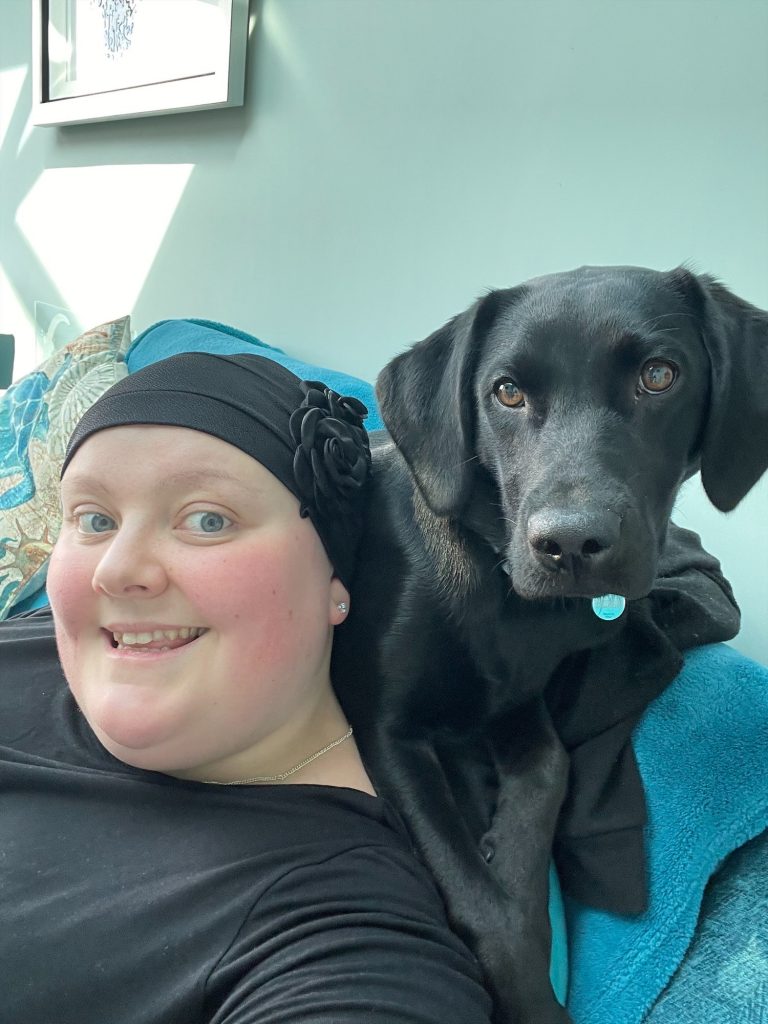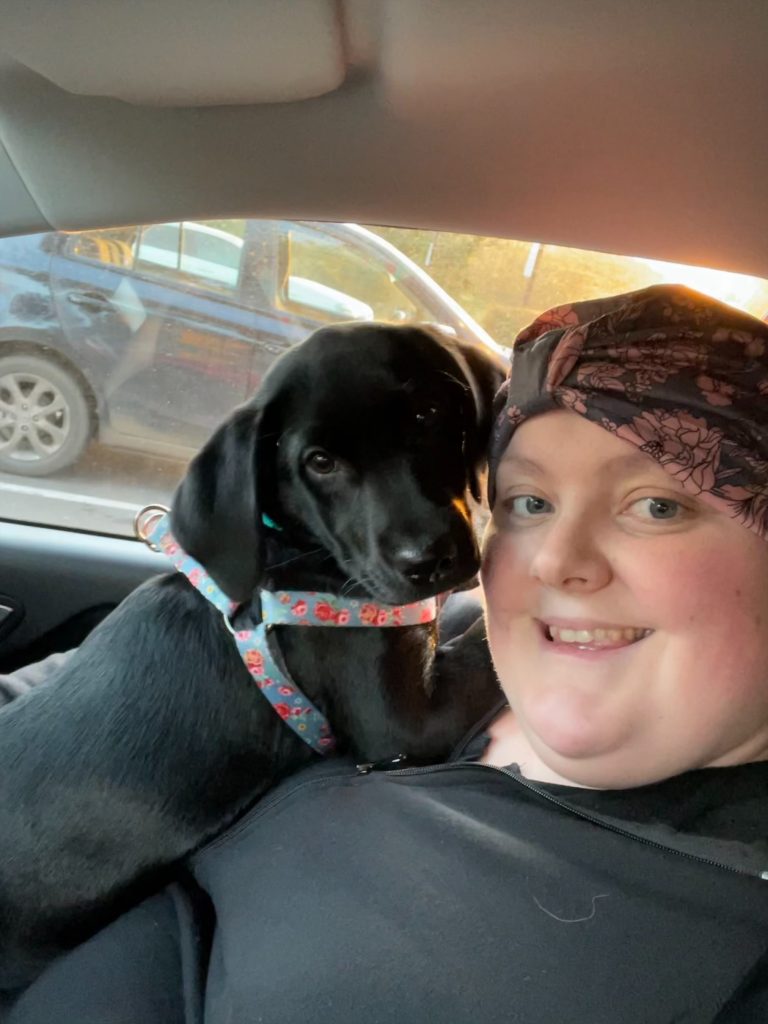Tasha
For our next interview in our series of ‘Your Behçet’s Stories’, we asked Tasha about her experiences of diagnosis, how she has dealt with challenging side-effects of her treatment, her wonderful therapy dog, and much more. Thank you to Tasha for sharing your story with us. If you’d like to take part in the series too, you’ll find all the details at the bottom of the page.
Tasha lives in Bath with her mum, dad and gorgeous black Labrador Luna Rose. She enjoys singing, listening to music, going to the theatre and spending time with her family and friends. Tasha had a long journey to diagnosis as for many years nobody knew what was wrong with her.
When did your symptoms first start and how did you eventually get diagnosed with Behçet’s?
When I was 8 years old I had pneumonia which I almost didn’t survive. After the pneumonia, my health went downhill and this is when all my problems started. When I was around 9 or 10 years old, I started to get diagnosed with other conditions including epilepsy and asthma. At the time we didn’t realise my symptoms were connected to Behçet’s disease.
In 2014 I was diagnosed with Crohn’s disease, which they tried to control with various medications. Then in 2019 I started to get what looked like punched out holes in my skin. They were very nasty lesions/ulcers called pyoderma gangrenosum. I had many investigations from several consultants, and I felt like I was going mad because they couldn’t work out what was wrong with me. Then I saw a dermatology consultant who asked if I had ever heard of Behçet’s disease and if she could refer me to the Birmingham Behçet’s Centre of Excellence, where I was diagnosed with Behçet’s disease in April 2020.
I always thought the mouth ulcers, eye irritation, joint pain and fatigue were just a part of my various health conditions. I never thought I would finally be diagnosed with one disease, and that all the other diagnoses were secondary to the Behçet’s. My official diagnosis is Behçet’s disease with Crohn’s like phenotypes.
What have you found to be the most difficult thing about having Behçet’s?
The thing I have found the most difficult about having Behçet’s is getting other people to understand the disease and how it affects me, and having to give lengthy explanations so that others will understand. I find with the disease being so rare that even some doctors haven’t heard of it, which is very hard and time consuming for them to give me the right support.
I do also find it hard to accept that I can’t do everything I want to and being so ill can cause me to have to cancel plans last minute, which can be very frustrating.
Would you like to tell us more about the rare side-effects of treatment you told us that you have suffered from such as hair loss? Do you have any advice for others who might be dealing with these difficult side-effects?
During my first trial of biologic treatment I did sadly get the very rare side-effect of hair loss. It began as just one clump of hair, but then more and more started to fall out. I had lovely long hair and when it started to fall out in larger clumps I didn’t want it going to waste. I put what I had left into a ponytail and chopped it off to send to the Little Princess Trust, who make real hair wigs for children. As hard as it was losing my hair, I did feel some achievement knowing I could make a beautiful wig for a child.
My self-confidence dropped a lot and it took a while for me to get used to how I looked without my hair, but the support from my friends and family helped me to regain some confidence. I also had the most amazing wigs, a real hair wig, which my auntie and uncle very generously bought for me and an NHS synthetic wig that my mum and dad kindly paid for. This really helped me. I feel if you have a good support network around you this is the best help you could ask for.
You said that you have a good support network of family, friends and professionals, which is great. Would you like to tell us more about them? And anything else you find helpful in terms of managing your condition?
I touched on it previously but I do think having a close support network helps a huge amount with both confidence and mood. I am lucky that I have the most amazing friends and family who even if they don’t understand how I’m feeling or coping, they try their hardest to help and support me in any way they can.
I also have a very supportive team of work colleagues. My management team have even taken the time to sit down and research the disease to try and support me in the best way they can. My team of consultants, doctors and nurses are truly amazing and I really do feel listened to. They take on board what I am saying as well as giving me advice and taking the time to explain why they are doing what they are doing, which I feel is really important.
When I was first diagnosed I joined a Behçet’s support group on Facebook, which I can honestly say has been brilliant. At first I was worried it may have been a bit depressing hearing what everyone is having to cope with but actually it’s a really lovely support group and people are so helpful, it makes me feel like my disease is “normal”.
My other very special form of support is my beautiful one-year-old pup Luna Rose. She is my therapy dog and I absolutely adore her.
She has helped me so much over the past year with my mental health and giving me the motivation I need. She makes me smile daily and is always happy to see me no matter how awful I may look or feel. When I’m feeling poorly she senses it and often cuddles into me. Her cuddles are the best and help me to feel that little bit better.
How do you manage your work with having Behçet’s?
I currently work as a medical receptionist/ medical secretary at a GP surgery. I am very lucky where I work to have such a supportive manager and supervisor who understand there will be times that I will need time off for illness of for appointments. I used to work full-time but unfortunately as my disease progressed I was off work more than I was in, as I couldn’t manage all the hours and was totally exhausted. I realised that I needed to reduce my hours in order to help myself and my illness. At first this was very hard to come to terms with and I felt I was failing, but after making that hard decision I realised it was the best thing I could do for myself. I now work 4 mornings a week and if I am unable to get into the surgery because I haven’t got the energy, I can work from home. This has been since the COVID-19 pandemic, and realising I can work well from home has been brilliant.
I am currently about to start a new job as a patient care coordinator at another GP surgery, working the same amount of hours but I will be helping patients with complex health needs and lots of clinical involvement to coordinate their care. I already do this for myself and can’t wait to be able to help patients with this as well.
What advice would you give to someone diagnosed with Behçet’s?
Don’t give up and be proud of who you are. This disease is horrible and sometimes trying to stay positive feels almost impossible but I always think if you can find just one tiny positive out of each day it will help you in the long run. For someone with a disease like ours, even something as tiny as managing to shower and get dressed in the day is in itself is one positive to take from the day.
I also feel it is very important to talk to people. It could be someone you know well or someone from a support group, but sharing how you’re feeling I find can make things a little bit easier. We can’t change who we are or what we have so all we can do is learn to appreciate what we have.
Thank you so much to Tasha for answering our questions!
Interview published 31/03/2022
Could your story help others?
We would like to share your personal experiences of diagnosis and living with Behçet’s, and we’d like to hear from a wide variety of patients, of all ages and backgrounds. We’d also like to hear from carers and/or family members of those affected by the condition.
If you’re a patient you might have some particular tips for managing your condition day-to-day that you would like to share to help others, or you might simply like to tell us your story of diagnosis or about a recent fundraising event you’ve been involved in. If you’re a carer or family member of someone affected by Behçet’s, you might wish to share your personal experiences of caring for someone with a rare condition. You can share as much or as little as you want with us.
If you are interested in taking part and would like to know more please email Deborah at info@behcetsuk.org
We look forward to hearing from you!


